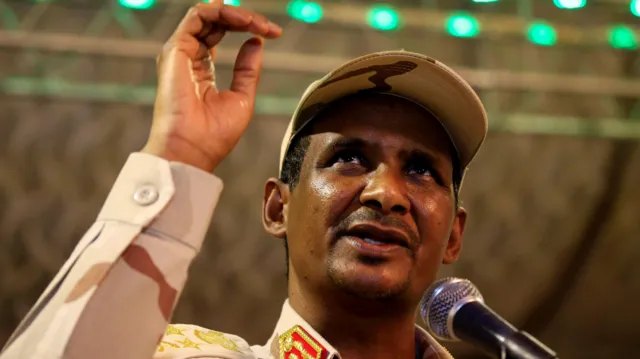The US has accused the Sudanese paramilitary Rapid Support Forces (RSF) of committing genocide and imposed sanctions on its leader.
US Secretary of State Antony Blinken on Tuesday said Mohamed Hamdan Dagalo, also known as Hemedti, was being punished for his role in “systematic” atrocities against the Sudanese people during the 20-month conflict.
He said the RSF and allied militias were responsible for the murder of “men and boys – even infants”, as well as brutal sexual violence against women on ethnic grounds.
The militias have also targeted fleeing civilians and murdered innocent people escaping the conflict, Blinken said.
“Based on this information, I have now concluded that members of the RSF and allied militias have committed genocide in Sudan,” he said.
In response, the RSF accused the US of double standards and failing to effectively address the ongoing crisis.
“The decision… expresses the failure of the [US President Joe] Biden administration to deal with the Sudanese crisis and the double standards it followed [with regards to the crisis],” Hemedti’s adviser, El-Basha Tbaeq, said in a post on his X account.
He added that this may complicate the Sudanese crisis and hinder negotiations to address the root causes of the conflict.
The RSF has been fighting the Sudanese military since April 2023, and there has been a growing outcry about its conduct during the war.
The US had previously determined that the RSF and other militias had engaged in war crimes, crimes against humanity, and ethnic cleansing in the western Darfur region, where the group has been accused of targeting and killing non-Arabs.
Both sides have been accused of atrocities, with the conflict leading to one of the world’s worst humanitarian crises.
In May, US special envoy for Sudan Tom Perriello said that some estimates suggested up to 150,000 people had been killed in the conflict.
Famine has been declared in several parts of the country, with 24.6 million people – about half the population – in urgent need of food aid, according to experts.
Blinken said neither the RSF nor Sudan’s military were fit to govern Sudan.
“Both belligerents bear responsibility for the violence and suffering in Sudan and lack the legitimacy to govern a future peaceful Sudan,” he said.
The sanctions bar Hemedti and his immediate family members from visiting the US, and any personal assets there are blocked.
Seven RSF-owned companies based in the United Arab Emirates and one other individual are also being sanctioned for helping the paramilitary group procure weapons. The UAE has denied numerous accusations that it is funding and arming the RSF.
In a statement, the UAE also said it took “its role in protecting the integrity of the international financial system extremely seriously. We remain committed to combating financial crime globally.”
Almost all the sanctioned companies are connected to the gold trade. One of them, AZ Gold, imports gold from Sudan and then sells it.
The US Treasury said in a statement that one of Hemedti’s brothers, Algoney, maintained access to AZ Gold’s bank account in the UAE, which held millions of dollars.
Hemedti and the RSF have controlled some of the country’s most lucrative gold mines, in Jebel Amer in North Darfur, and is now said to control others in Songo near the border with Central African Republic, as well as more over the border.
The sanctioning of Hemedti, means all three Dagalo brothers, including his deputy Abdel Rahim and his younger brother and procurement chief Algoney, are now under US sanctions.
What difference will this make?
The US has faced criticism that it has not done enough to end the conflict in Sudan, despite its involvement in the 2023 Jeddah talks and more recently through the Aligned for Advancing Lifesaving and Peace in Sudan (ALPS) group talks, so this is a significant intervention by the outgoing Biden administration.
This designation may receive bi-partisan support from Congress and indicates to the incoming Donald Trump administration how the US now considers the RSF.
Hemedti is not known to have any assets in the US, but the genocide designation will impact all the business arms of the RSF.
The US actions may not have an immediate effect on the fighting on the ground, but will certainly ratchet up the pressure on regional backers to distance themselves and be wary of doing business with the RSF.
It might also complicate any attempt to establish any administration within the RSF-controlled territories.
The RSF controls about 50% of the country, including almost all of Darfur, Khartoum and other areas south of the capital, while the army has been forced to move to Port Sudan in the east.
It is not clear whether this designation will bring a renewed interest in ceasefire talks. Recently, the Sudanese army hinted at accepting Turkish mediation with the UAE over the conflict. BBC


